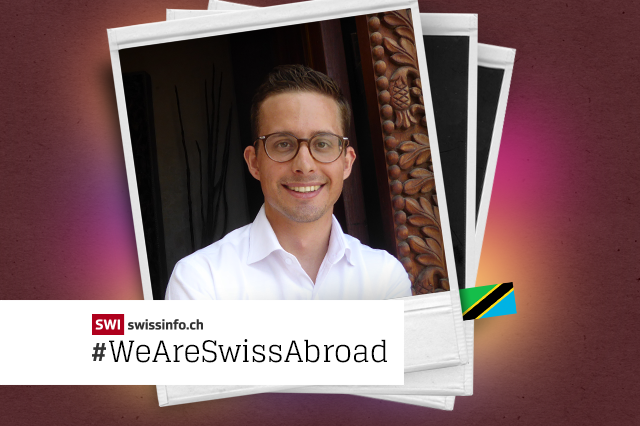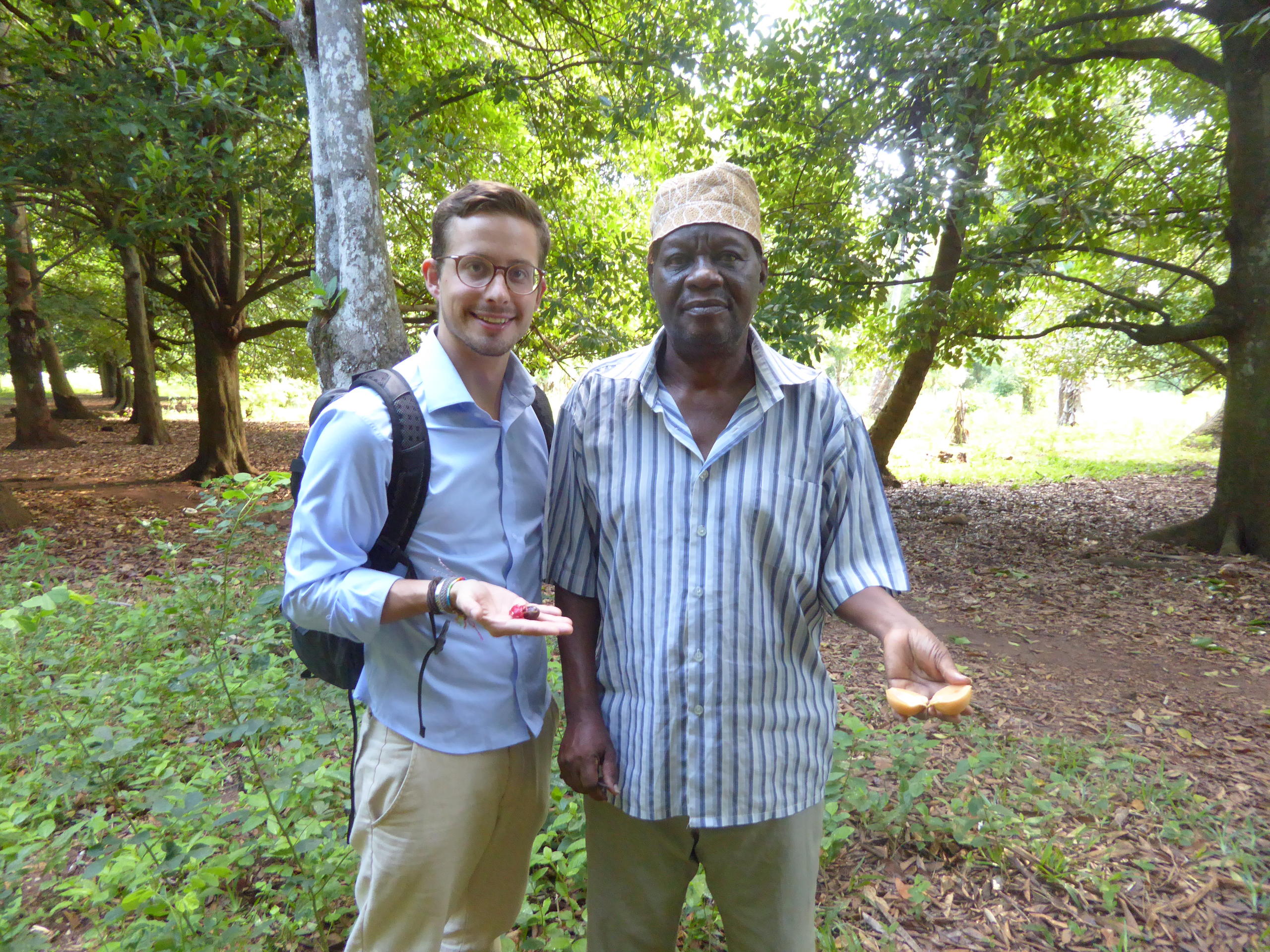Aroma of spices woos Swiss lawyer out of his office

When backpacking, lawyer Raphael Flury fell in love with East Africa and its natural products. The 28-year-old Swiss abroad is now managing a certified organic spice production company on the Tanzanian spice island of Zanzibar.
swissinfo.ch: Why did you leave Switzerland?
Raphael Flury: Working as a young lawyer in Switzerland was interesting and demanding. I was actually content with my professional and private life. After I had completed an exchange semester in Lausanne during my university years, I went backpacking through Asia, East Africa and Central America. My international experience on this trip really taught me a lot. When I was in between my bachelor’s and master’s degree, I travelled to Tanzania where I had the opportunity to temporarily manage the daily business of a coffee farm. Thanks to the positive experience I had gained in the East African private economy as well as my desire to take an unconventional step towards an interesting but professional life, it did not take much for my current bosses to convince me to take over their Tanzania businessExternal link. Tanzania’s beauty and welcoming culture were a pleasant side effect, but not a decisive argument.
The points of view stated in this article, especially about the host country and its politics, are the interviewee’s points of view and are not necessarily in line with swissinfo.ch’s position.
swissinfo.ch:Zanzibar is known as the “spice island”. Your job is to produce spices. How did this come about?
R.F.: During my time at the coffee farm, I discovered my interest in natural raw materials as well as “emotional products”. Coffee and spices are wonderful goods that make people happy.
It’s very fulfilling to work with natural products such as cinnamon, vanilla and cloves as well as learn from the small famers how these products are produced and processed. Did you know that Ceylon cinnamon chips are scraped from the bark of the cinnamon tree, hand-rolled and sun-dried for three to four days?
swissinfo.ch:When did you definitely emigrate to Tanzania?
R.F.: I gave up my Swiss residency at the end of 2016.
swissinfo.ch:How did you experience the first few months abroad?
R.F.: Due to my previous work experience in East Africa, I was well prepared for my task in Tanzania. Taking over the management, being a newcomer in the spice industry as well as reorganising and adjusting my private life to my new surroundings were still pretty intense. My Sunday trips to the pristine beaches of the island seemed almost surreal in comparison with the turbulences of everyday life.

swissinfo.ch:Do you think you will ever return to Switzerland?
R.F.: I’m very grateful to have been born in Switzerland. I think it would be wrong to completely rule out a return to such a wonderful country. However, once you have taken a successful step into an international working environment as well as life, many other interesting opportunities suddenly open up around the globe.
swissinfo.ch:Where exactly do you live on the island and what’s your life and the cuisine like?
R.F.: I live in Zanzibar Stone Town, which is the historic old town. My life here reminds me of my childhood in a Swiss village. Everybody knows and greets each other, people are always happy to have a chat in the streets and support each other whenever help is needed. I was very well received by the population, which is 99% Muslim. Their hospitality as well as their balance between tradition and openness towards new things is laudable.
As Zanzibar has been on some of the most important shipping routes for centuries, the island is a melting pot of cultures. Apart from its East African character, it’s also greatly influenced by oriental cultures. Hence, the food in Zanzibar is very versatile and it’s a culinary paradise.
swissinfo.ch:What is the biggest difference between Tanzania and Switzerland?
R.F.: There are many niches on the Tanzanian market. If you tackle something with Swiss diligence and follow your goal continuously, you can basically make a living here.
This freedom, however, comes with a big danger. Those with a low frustration tolerance and little patience will probably get lost and find the Tanzanian equanimity a hard nut to crack. I guess Tanzanians are probably the masters of ad hoc improvisation. The basic rule is “expect the unexpected”, but everything usually works out in the end one way or another.
Geographically, the country is enormous and has many different climatic zones, which makes the living space and outdoor activities so attractive.
swissinfo.ch:How do you view Switzerland from afar?
R.F.: Our place of birth is one of the few crucial things in life we have no influence over. This is why we should be grateful to have grown up in such a stable, safe, peaceful and well-organised country like Switzerland. Once you live abroad though, you get to know many other ways of living that could actually help some Swiss be more content. Switzerland runs like a well-lubricated clockwork, but only as long as everyone pulls the strings in the same direction.
swissinfo.ch:Are you interested in Tanzanian politics?
R.F.: Naturally, local and international political events are relevant for me and the company. Over the past two years, Tanzania has undergone significant political changes which have had a direct impact on the current economic situation. Since the new government was elected, there has been a general feeling of economic uncertainty among locals as well as the expat community. Several international firms have temporarily closed their local subsidiaries. The industry monitors the development and waits patiently. Having said that, Tanzania is still a pretty stable country where tourists can travel safely.
swissinfo.ch:Do you vote in Swiss elections and popular votes?
R.F.: As a matter of conviction, I used to cast my ballot in every single election or popular vote, something I no longer quite manage to do since I have moved here. This is why I deeply regret that a few years ago, e-voting was interrupted due to a security gap in my home canton.
Thus, I think it’s great that the government wants to slowly shift e-voting from its pilot phase to its proper operations. However, the critical national discussions about security and the protection of voting secrecy are still important and necessary as e-voting will certainly expose our democracy to the risks of cybercrime and influence of third states. In my opinion, however, the proposed popular vote on banning e-voting altogether for safety reasons is a bit too hasty.
swissinfo.ch:What do you miss most about Switzerland?
R.F.: I think it’s very laudable that Swiss employees are generally fully committed to their daily work and do everything to support their employers and indirectly the Swiss economy as a whole. Good service providers as well as efficient procurement opportunities of high quality goods are a rare commodity abroad. Last but not least, I miss the people’s environmental awareness, personal health and road safety.
Are you a Swiss citizen living abroad? If so add the hashtag #WeAreSwissAbroadExternal link to your photos on Instagram
Translated by Billi Bierling

In compliance with the JTI standards
More: SWI swissinfo.ch certified by the Journalism Trust Initiative





You can find an overview of ongoing debates with our journalists here. Please join us!
If you want to start a conversation about a topic raised in this article or want to report factual errors, email us at english@swissinfo.ch.